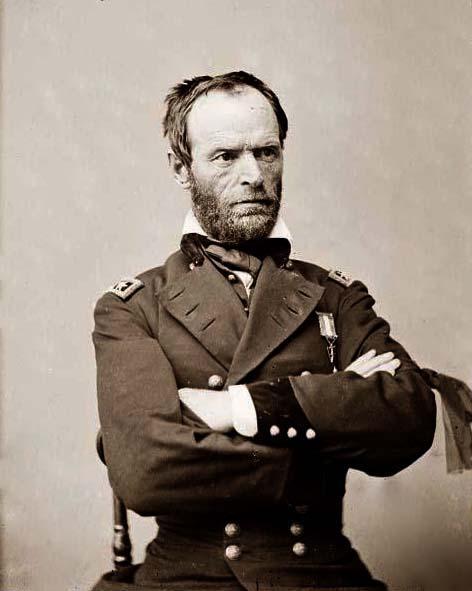
General William T. Sherman, photographed in 1865 with a black armband for the recently assassinated President Abraham Lincoln. Today he reminds us the consequences of pushing extremism.
[…those who brought war into our country deserve all the curses and maledictions a people can pour out…]
Today, April 12, many will be talking about the 50th anniversary of Yuri Gagarin’s orbital mission into space. It is also, however, the 150th anniversary of the Confederacy’s attack on the federal garrison on Fort Sumter – the action that required President Abraham Lincoln to finally act decisively on the rebel states.
Thus began a Civil War, that in many ways has not ceased today. As then, today conservative forces (this time Republican, not Democratic as 150 years ago) complain of an intrusive Federal government and speak of a trampling of “states’ rights”. Ironically, these same conservative forces claim a love of God, Constitution, and Country – though their political actions hardly show such love or empathy. “No compromise” is the rallying theme of these extreme forces. Then… and now.
Three and a half years after the Confederate attack on Fort Sumter, during his famous “March to the Sea”, Union General Sherman intended on striking a great wound to the rebel states – to bring the war to the local populace. It was Sherman’s theory that the civilians aided the rebel troops with morale and materials and he thought it time to make the South “howl” – to break these efforts and bring a conclusion to the bloody war. He intended to waste Atlanta and sent word ahead to have the women and children removed from the city. Confederate General Hood implored Sherman – in the name of God – not to lay siege on Atlanta. Sherman’s response, clear and direct, lays down one of the best descriptions of what the rebel states had done. Today, with similarly childish and hypocritical saber-rattling and brinkmanship from extreme conservative forces in the nation, it is worthwhile to recall Sherman’s memo to Hood on the matter:
In the name of common sense, I ask you not to appeal to a just God in such a sacrilegious manner – you, who, in the midst of peace and prosperity, have plunged a nation into civil war, “dark and cruel war,” who dared and badgered us to battle, insulted our flag, seized our arsenals and forts that were left in the honorable custody of a peaceful ordnance sergeant, seized and made prisoners of war the very garrisons sent to protect your people against negroes and Indians, long before any overt act was committed by the (to you) hateful Lincoln Government, tried to force Kentucky and Missouri into the rebellion in spite of themselves, falsified the vote of Louisiana, turned loose your privateers to plunder unarmed ships, expelled Union families by the thousand burned their houses, and declared by act of your Congress the confiscation of all debts due Northern men for goods had and received. Talk thus to the marines but not to me, who have seen these things, and who will this day make as much sacrifice for the peace and honor of the South, as the best born Southerner among you. If we must be enemies, let us be men, and fight it out as we propose to-day, and not deal in such hypocritical appeals to God and humanity.
Update (4/12/11): Pew Research just released a poll showing how split the US is on the topic of the Civil War, including the fundamental causes. Those who don’t learn from history…

[…] vocal minority. And, like the Confederacy of old, this minority already has it pretty good. William T. Sherman would have something interesting to say about this proposed amendment. It might have even been […]
When I read Sherman’s memoirs (and the above quote) his phrase “Talk thus to the marines” struck me as a curious remark. What is the context? What is Gen. Sherman making reference to and why would Sherman make such a remark? Was he referring to the Marine Corps? If so why wasn’t the “m” capitalized?
As a veteran of the Marine Corps I wondered if this possibly is the genesis of one of the aphorisms associated with the Marine Corps i.e. “Tell it to the Marines!” What do you think?
Big talk. Low empathy. The poor always bear the brunt of wars, as did poor immigrant soldiers in the north, poor white trash in the south, and the starving confederate army.